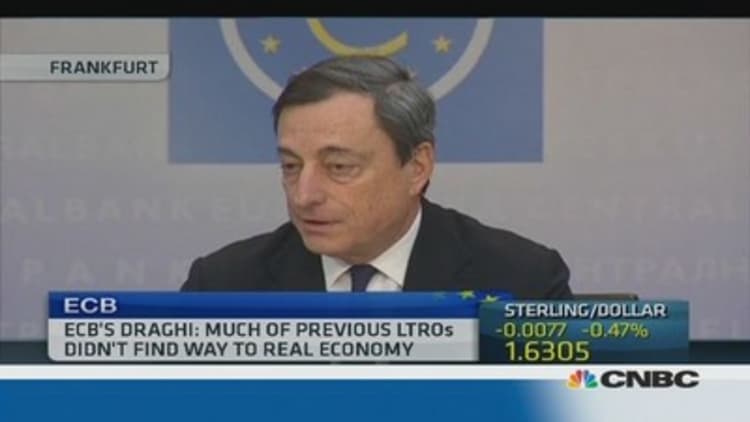
Unemployment at record highs and fragile growth may not be the most fertile of soil for a recovery, but Andrew Lillico, the director of consultancy group Europe Economics, has told CNBC that the euro zone is ready to rise as the next economic superpower.
"Much as the 80s might have been the Japanese decade and the 90s the U.S. decade and the 2000s the Chinese decade, the 2020s could be the European decade," he told CNBC Friday.
"I think that the fundamentals of the euro zone collectively are rather stronger than those of the U.S. and the U.K....the euro zone has been in a better position to tough out the events of the past few years, without engaging in nearly so much money-printing."
(Read More: Stressful times for Europe's banks)
Following the financial crash of 2008, nations across the globe have been busy restructuring and rebalancing their economies. Substantial sovereign and bank debt led the euro zone to fall into a prolonged recession in 2011 as the extent of its problems became fully aware. Meanwhile, the U.S. has since posted modest growth with an annualized reading of 3.6 percent on Thursday with the U.S Federal Reserve fiercely backstopping its economy with $85 billion-a-month in quantitative easing.
Mario Draghi, the president of the European Central Bank (ECB) has previously ruled out Fed-style asset purchases due to the lack of capital markets seen in the U.S. But the ECB has been busy keeping interest rates low and using refinancing programs to pump liquidity into European lenders in an effort to fight the possibility of deflation.
The euro zone's unemployment rate stands at 12.1 percent, according to Eurostat, compared with levels of 7 percent in 2007. In contrast, the United States posted an unemployment rate of 7.3 percent for October. Debt-to-GDP (gross domestic product) ratios this year are expected to be 95 percent for the Euro area and 108.1 percent for the U.S., according to the International Monetary Fund.
(Read More: CFOs warn on froth in US stocks, tech, bitcoin)
It's the vast restructuring that the euro zone is embarking on that Lillico sees as reason for optimism. Early assessments are being made for a banking union in the bloc and the 17 nations are set to grow politically closer.

"By the end of this decade, the European Union is likely to have resolved much of its political difficulties. It would be well on the way to, if not formally established, the confederate state," he said.
Structural changes like labor law reforms, cuts in public sector salaries and government deficits are some of the key changes that could allow the euro economy to blossom in the next decade, he said.
(Read More: Holiday spending highlights US wealth gap: Nomura)
"There will be considerable scope for catch up. So we'll see unemployment coming down in some countries by quite a lot in that period," he said. "You've got lots of extra workers to bring into the labor market before you start getting any inflationary pressure."
He added that economies like Germany are well-placed to meet the needs of China and India as their economies mature to be more consumption-led. It wouldn't be classed as a "boom," he said, but believes the euro zone would shine in comparison to the U.S. and the U.K.
— CNBC.com's Matt Clinch. Follow him on Twitter @mattclinch81


